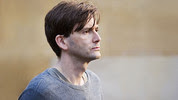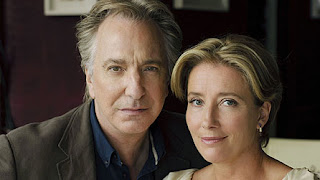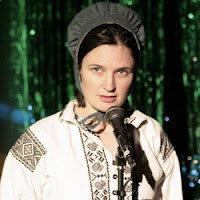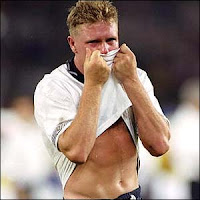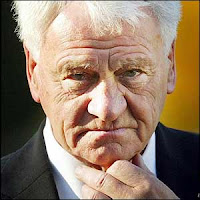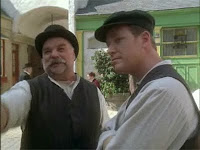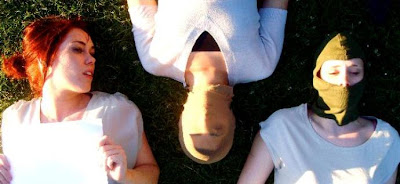
Although, it's not actually you she's asking: that's just a letter Jemma (one of The Paper Birds) has written to other women asking them to share stories for Others. The three women featured are an Iranian artist, a prisoner in a British jail and a celebrity (Heather Mills, who seems not to have replied to her letter). That's one for each of the three women who form The Paper Birds and present their work at The Junction in a simple style, speaking directly to their audience, voices sometimes overlapping, contradicting or supporting each other. Meanwhile, music is occasionally provided by a meek male figure who hangs forlornly about the edge of the stage, speaking only to tell us his name (Jonathan).
There's a certain forced attempt at audience interaction as The Paper Birds wait for their front of house clearance. Others becomes a long interruption of their conversation with the audience, the show is what happens while they try and do other things, seemingly distracted by offstage sounds. The Paper Birds tease at the fourth wall in the opening of their show, but never actually do anything with it (not until a suddenly startling moment later on, when their Iranian correspondent blames the West for her troubles, which is all the more powerful for being so sudden).
The Paper Birds' dramatisation of the Iranian artist's story punctures our Western generalisations about Iran and the Middle East. It makes our Western perceptions seem ludicrous and questions our ability to ever really understand the 'other', not just in this case but in all cases. That's the heart of Others: perception and understanding of people who are different, people who are 'other'. The difficulty in understanding is also conveyed far more subtly by undermining Western generalisations than by having Shani Erez (another of The Paper Birds) repeatedly insist that English speakers don't understand people from the Middle East.
The project to find 'others' also leads to a northern UK prison and a woman serving a life sentence for manslaughter. Despite repeated claims of 'It's not about us [The Paper Birds]', this woman's life is seen through the curiosity (read: barely-disguised voyeurism) of those same Paper Birds. Again, the character is purely 'other' and the focus of narrative slant is on the audience/narrators' perception of that 'other'.
 Nowhere is this more clear than with the case of the third 'other': Heather Mills. Her entire life appears to have become a media circus, with everyone's perception of her filtered through a hostile press. In Others, she isn't even allowed to answer questions herself (possibly because she hasn't given The Paper Birds any answers). Instead The Paper Birds answer questions for her, increasingly diverging from the facts about Mills' life and into personal speculation. Such is our treatment of celebrities (and often non-celebrities).
Nowhere is this more clear than with the case of the third 'other': Heather Mills. Her entire life appears to have become a media circus, with everyone's perception of her filtered through a hostile press. In Others, she isn't even allowed to answer questions herself (possibly because she hasn't given The Paper Birds any answers). Instead The Paper Birds answer questions for her, increasingly diverging from the facts about Mills' life and into personal speculation. Such is our treatment of celebrities (and often non-celebrities).Mills and The Paper Birds seem to be part of a group of women (ie. all women) who've suffered at the hands of men. In fact, men come out of Others pretty badly. At best, they heartlessly break up with devoted and devastated women, leaving emotional wreaks behind. At worst, they're serial abusers who father multiple children without a second thought. Could this be the real 'other'? Violent masculinity that that somehow ensnares devoted affection?
Maybe that's what The Paper Birds are somehow really trying to understand, as much as the 'other' women they claim to seek. Or maybe I think that because, as a man, all of these women are my 'other'; that's the kind of thinking sparked off by Others. The Paper Birds do genuinely question perceptions of the 'other' and handle their material in a thought-provoking manner. But it might be interesting to see who Jonathan would find as his 'other'.
Thanks to The Junction, Cambridge's website and jeckman for the images.

